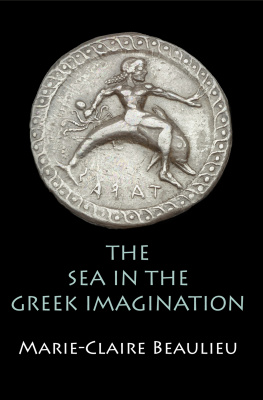Beaulieu - The Sea in the Greek Imagination
Here you can read online Beaulieu - The Sea in the Greek Imagination full text of the book (entire story) in english for free. Download pdf and epub, get meaning, cover and reviews about this ebook. year: 2019, publisher: University of Pennsylvania Press, genre: Romance novel. Description of the work, (preface) as well as reviews are available. Best literature library LitArk.com created for fans of good reading and offers a wide selection of genres:
Romance novel
Science fiction
Adventure
Detective
Science
History
Home and family
Prose
Art
Politics
Computer
Non-fiction
Religion
Business
Children
Humor
Choose a favorite category and find really read worthwhile books. Enjoy immersion in the world of imagination, feel the emotions of the characters or learn something new for yourself, make an fascinating discovery.
- Book:The Sea in the Greek Imagination
- Author:
- Publisher:University of Pennsylvania Press
- Genre:
- Year:2019
- Rating:5 / 5
- Favourites:Add to favourites
- Your mark:
- 100
- 1
- 2
- 3
- 4
- 5
The Sea in the Greek Imagination: summary, description and annotation
We offer to read an annotation, description, summary or preface (depends on what the author of the book "The Sea in the Greek Imagination" wrote himself). If you haven't found the necessary information about the book — write in the comments, we will try to find it.
The Sea in the Greek Imagination — read online for free the complete book (whole text) full work
Below is the text of the book, divided by pages. System saving the place of the last page read, allows you to conveniently read the book "The Sea in the Greek Imagination" online for free, without having to search again every time where you left off. Put a bookmark, and you can go to the page where you finished reading at any time.
Font size:
Interval:
Bookmark:

The Sea in the Greek Imagination
THE SEA IN THE GREEK IMAGINATION

Marie-Claire Beaulieu

UNIVERSITY OF PENNSYLVANIA PRESS
PHILADELPHIA
Copyright 2016 University of Pennsylvania Press
All rights reserved. Except for brief quotations used for purposes of review or scholarly citation, none of this book may be reproduced in any form by any means without written permission from the publisher.
Published by
University of Pennsylvania Press
Philadelphia, Pennsylvania 19104-4112
www.upenn.edu/pennpress
Printed in the United States of America on acid-free paper
1 3 5 7 9 10 8 6 4 2
Library of Congress Cataloging-in-Publication Data
Beaulieu, Marie-Claire, 1979
The sea in the Greek imagination / Marie-Claire Beaulieu.
pages cm
Includes bibliographical references and index.
ISBN 978-0-8122-4765-7
1. OceanReligious aspects.2. OceanMythology.3. Mythology, Greek.4. Liminality.5. Life.6. Death.
I. Title.
BL795.O34B43 2016
292.2'12dc23
2015012859
mes parents
CONTENTS

ABBREVIATIONS

References to ancient sources follow the abbreviations used in the Oxford Classical Dictionary. Abbreviations for periodicals in the bibliography follow LAnne Philologique. The following abbreviations are used for collections and reference works:
AASS | Acta Sanctorum. 68 vols. Antwerp: Socit des Bollandistes. Online: 2001. Cambridge: Chadwyck-Healey. http://acta.chadwyck.com. |
Beazley, ARV2 | John Beazley. 1963. Attic Red-Figure Vase Painters. 2nd ed. Oxford: Clarendon. |
CVA | Corpus Vasorum Antiquorum. 1922. |
DK | H. Diehls, rev. W. Kranz, eds. 1952. Die Fragmente der Vorsokratiker. 6th ed. Berlin: Weidmann. |
EGF | Malcolm Davies, ed. 1988. Epicorum Graecorum Fragmenta. Gttingen: Vandenhoeck and Ruprecht. |
FGrH | F. Jacoby et al., eds. 1923. Die Fragmente der griechischen Historiker. Berlin: Wiedmann. |
FHG | Karl Mller, ed. 184170. Fragmenta Historicorum Graecorum. Paris: Editore Ambrosio Firmin Didot. |
IG | Inscriptiones Graecae. 1873. Berlin: Brandenburgische Akademie der Wissenschaften. |
IGRR | Cagnat, ed. 190627. Inscriptiones Graecae ad res Romanas pertinentes. Paris: Librairie Ernest Leroux. |
LIMC | Lexicon Iconographicum Mythologiae Classicae. 8 vols. plus indices, 198199; Supplement, 2009. Zrich: Artemis & Winkler Verlag. |
LSCG | F. Sokolowski. 1969. Lois sacrs des cits grecques. Paris: De Boccard. |
OGIS | Dittenberger, ed. 19035. Orientis Graeci Inscriptiones Selectae. 2 vols. Leipzig: S. Hirzel. |
PCG | R. Kassel and C. Austin, eds. 1983. Poetae Comici Graeci. Berlin: De Gruyter. |
PG | J.-P. Migne, ed. 185786. Patrologia Graeca. 162 vols. Paris: Imprimerie Catholique. |
PMG | D. Page, ed. 1962. Poetae Melici Graeci. Oxford: Clarendon. |
RE | A. Pauly, rev. G. Wissowa, eds. 18941980. Realencyclopdie der classischen Altertumswissenschaft. Stuttgart: J. B. Metzler. |
SEG | Supplementum Epigraphicum Graecum. 1923. Leiden: Brill. |
TrGF | B. Snell, S. Radt, and R. Kannicht, eds. 19712004. Tragicorum Graecorum Fragmenta. Gttingen: Vandenhoeck and Ruprecht. |
Introduction
The sea is everywhere in the Greek landscape. From rugged mountaintops to low-lying plains, the Mediterranean is rarely out of sight. For islanders and coastal villagers the sea is more than a geographical reality, it is a way of life. This was even truer for the Greeks of Antiquity, who were excellent seafarers and sustained fisheries from the earliest times onward. In fact, the Greeks relied on the sea not only for sustenance and transportation, but also for news, warfare, commercial and political exchange, as well as scientific development. The sea also held a large place in the religious life of the Greeks. Seawater was used for various kinds of purification, many rituals were held on the seashore, and some festivals required throwing offerings to the gods into the sea. Seafaring was also the occasion for numerous rituals. In this way, the sea pervaded many aspects of ancient life.
Looking at the Mediterranean, bright blue in the Greek sunlight, one might expect to find the sea associated with positive concepts in Greek literature, especially nourishment, beauty, and divinity. Homer calls the sea the bright sea, the divine sea (e.g., Il. 1.141). Myths tell of beautiful Nereids living in the water and of lucky finds on the seashore. In part for these reasons, psychoanalysts have viewed the sea as a representation of the mother figure. Oceanus and his wife Tethys are remarkably fertile, giving rise to three thousand Oceanids, three thousand Naiads, and their brothers the three thousand rivers.
Yet for all its fertility and the nourishment it provides, the sea is not exclusively female in Greek mythology. The sea is personified as the Titans Pontus and Oceanus, who are male. Likewise, the Greek language includes many words for the sea, namely the high sea, / the salt water, the sea, and the sea. Of these words, and are masculine while , , and are feminine. Finally, the mythical creatures that inhabit the sea, such as Nereids, Oceanids, and Tritons, are either male or female. It is therefore difficult to understand the sea as a mother figure in a Greek context, since it is not exclusively female.
Moreover, the seas fertility is counterbalanced by a reputation for barrenness. Homer calls the sea fruitless, unharvested. This curious epithet contrasts the sterility of salt water with the fertility of the fields on the earth and the fresh water that irrigates them. Even the numerous fish that inhabit the sea (cf. the Homeric epithet the fish-filled sea) evoke death rather than sustenance, as sailors worry that their bodies will be mangled by fish in case of shipwreck.
Finally, the common view of the entrance to Hades as a chasm in the earth competes with a representation of Hades as located beyond the sea, on the shores of the Ocean. Thus the sea has an ambivalent character in Greek culture. It is a source of food and a path of communication, but also a disquieting empty and barren space that evokes death and can even lead to Hades.
The two visions of Hades as located beyond the sea or under the earth are not antithetical. In Greek cosmology, the earth is surrounded by the encircling river Ocean, which can be accessed by sailing out of the Mediterranean through the Pillars of Heracles (the Strait of Gibraltar), or out of the Black Sea in the east. Thus, when death is represented as a sea voyage to the Ocean, it can lead either to the Underworld or to the Islands of the Blessed. In the case of Heracles, who acquires immortality as a result of his exploits on the Ocean, he travels upward to Olympus. As this book demonstrates, the sea, because it is in between the earth, the Underworld, and Olympus, mediates between the worlds of the living, the dead, and the gods.
Font size:
Interval:
Bookmark:
Similar books «The Sea in the Greek Imagination»
Look at similar books to The Sea in the Greek Imagination. We have selected literature similar in name and meaning in the hope of providing readers with more options to find new, interesting, not yet read works.
Discussion, reviews of the book The Sea in the Greek Imagination and just readers' own opinions. Leave your comments, write what you think about the work, its meaning or the main characters. Specify what exactly you liked and what you didn't like, and why you think so.









